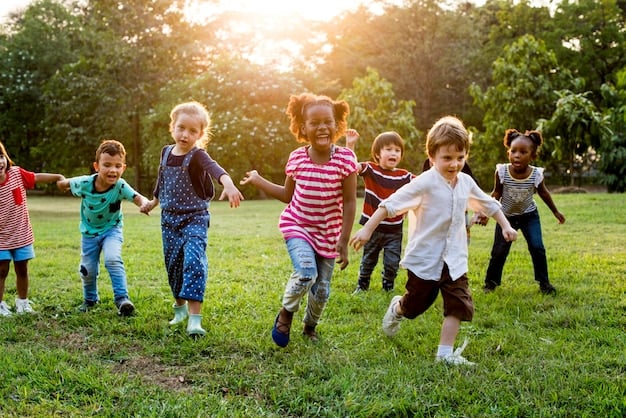🎉Play With a Purpose: How Fun Fuels Cognitive and Motor Development in Kids!🧠🧸
🎉Play With a Purpose: How Fun Fuels Cognitive and Motor Development in Kids!🧠🧸
Play is more than just giggles and games—it's one of the most powerful tools we have for supporting a child’s brain and body #development. From navigating obstacle courses to building block towers, #play helps children explore their world, solve problems, and strengthen critical physical skills. This article dives into how #educators and caregivers can intentionally use play to promote both cognitive and motor development in young learners.
🧐 Why Is Play So Important for Child Development?
Play is the foundation of all learning in #early-childhood. It’s how kids experiment, process emotions, and discover how the world works. Through imaginative play, physical activities, and creative exploration, children build the cognitive skills they’ll use for a lifetime.
Learn more about the power of play in this article: The Importance of Play for Child Development.
🧠 How Does Play Boost Cognitive Skills?
When children play, they're doing much more than having fun—they’re solving problems, practicing #language, using memory, and learning to think critically. For example:
-
Pretend play helps develop abstract thinking and planning.
-
Board games improve memory, focus, and executive function.
-
Building blocks and #puzzles teach sequencing, spatial reasoning, and cause-and-effect.
Want to integrate literacy into playtime? Check out our course:
➡️ Play Safe, Think Big: Literacy Through Play
🏃 How Does Play Help With Motor Skills?
Play naturally encourages children to use their muscles, improving both gross motor (large movements like running and jumping) and fine motor (small, controlled movements like drawing or buttoning).
Try activities like:
-
Climbing for core strength and coordination.
-
Ball games for hand-eye coordination.
-
Art projects for finger dexterity.
Get even more ideas from our course:
🎨 Play, Learn, Grow: Activities for All Areas of Development
🌳 Can Outdoor Play Make a Difference?
Absolutely! Outdoor environments provide unique #sensory and physical challenges that promote #healthy development. Whether it's balancing on logs, digging in sand, or riding tricycles, #outdoor-play encourages movement, risk assessment, and exploration.
Dig deeper into outdoor play benefits here:
☀️ Outdoor Play Benefits for Preschoolers
🎓 How Can Educators Use Play Intentionally?
Intentional teaching through play means:
-
Observing children's interests and tailoring activities to their #developmental level.
-
Facilitating play by offering props, space, and encouragement.
-
Scaffolding learning with questions and gentle challenges.
The key is to balance #freedom and structure—let children #lead, but be ready to guide learning moments when they appear.
📲 Where Can You Find More Inspiration?
Follow ChildCareEd.com on social media for:
-
Weekly activity ideas
-
Research-backed teaching strategies
-
Course updates
-
Fun challenges and giveaways!
📍Instagram, Facebook, and Pinterest — connect with a vibrant community of educators just like you.
Remember: Play is the work of childhood—and with the right tools and insights, you can turn every #playful moment into a powerful learning experience.
Let’s keep learning through laughter! 🌟
- Building Vocabulary
- Play Safe, Think Big: Literacy Through Play
- CDA Bridge Bundle: Infant/Toddler without Portfolio Review
- Balancing Active Play in Child Care
- CDA Bridge Bundle: Family Child Care without Portfolio Review
- The Best Promotion is Play
- CDA Bridge Bundle: Preschool without Portfolio Review
- No Such Thing as Boring Math
- Terrible Two's Can Be Terribly Fun!
- Healthy Cooking for Picky Kids
- Fine Motor Skills in Kids: From Finger Painting to Chopstick Mastery
- Gut Gnomes and Fairy Food: How to Feed the Magical Creatures Living in Your Kid’s Tummy
- Mummy Races & Zombie Tag: Halloween-themed Gross Motor Games
- How to boost fine motor skills: Holiday Edition
- DIY Snow Globes: The Fine Motor Craft That’ll Keep Kids (and Adults) Busy for Hours
- Reindeer Ready? Creative Holiday Games to Engage Preschoolers
- Small Hands, Big Achievements: Why Fine Motor Skills Are More Than Just Fun and Games
- Big Snowflakes, Bigger Milestones: Supporting Child Development Through Seasonal Activities
- St. Patrick’s Day Activities for Kids: Fun, Educational, and Easy Ideas for Parents & Teachers
- Hoppin’ Into Easter: 10 Outdoor Easter Gross Motor Activities
- ☀️ Summer Smiles: Creative and Fun Activities for Preschoolers 🎨🌻
- 🧠Play with a Purpose: How Play-Based Learning Boosts Brainpower
- 🎉Play With a Purpose: How Fun Fuels Cognitive and Motor Development in Kids!🧠🧸
- Why Do Children Need So Much Repetition?
- How Can Teachers Support Every Part of a Child’s Development? 🧠❤️
